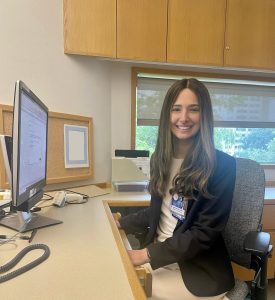The Celiac Disease Foundation, the nation’s leading patient advocacy organization for celiac disease, announces Leslie Saba, MB BCh BAO, as the recipient of the Celiac Disease Foundation-Jocelyn Silvester Rising Villus Student Research Award, an award designed to foster interest in the field of celiac disease research among promising medical students, graduate students, and residents.
 Dr. Saba, a resident in the Pediatric and Adolescent Medicine Residency Program at the Mayo Clinic in Rochester, Minnesota, will use the grant to evaluate current practices for screening and follow-up care of celiac disease in children who also have type 1 diabetes.
Dr. Saba, a resident in the Pediatric and Adolescent Medicine Residency Program at the Mayo Clinic in Rochester, Minnesota, will use the grant to evaluate current practices for screening and follow-up care of celiac disease in children who also have type 1 diabetes.
Dr. Saba’s research aims to guide future management of dual diagnosis and identify areas for improvement in ongoing care. This includes determining optimal screening and diagnostic testing methods and integrating multidisciplinary visits and lab work for these high-risk groups.
Celiac disease and type 1 diabetes are both autoimmune disorders that frequently co-occur due to shared genetic factors. Proper screening and follow-up for these conditions in children are crucial to ensure early diagnosis and management, which can prevent complications and improve quality of life. Regular monitoring helps tailor treatment plans, ensuring both conditions are effectively managed to minimize health risks.
The Jocelyn Silvester Rising Villus Award, named in honor of Dr. Jocelyn Silvester, reflects the Celiac Disease Foundation’s dedication to advancing celiac disease research opportunities for the next generation of scientists. We invited Dr. Saba to share her research with our audience. Please continue reading as she answers a few questions for our community.
CDF: Please tell us about yourself and your background. What drew you to the field of celiac disease research?
Dr. Saba: Celiac disease is one of the most common autoimmune diseases affecting children, and is more prevalent in children with type 1 diabetes. During my clinical experiences so far, I witnessed how managing celiac disease in children with type 1 diabetes added an extra layer of complexity to their already demanding diabetes care, and how it can significantly impact their quality of life. Through this research project, I hope to identify gaps in care and develop strategies to improve the care of patients with both conditions.
CDF: Can you share an overview of your current research project? What question or challenge are you setting out to address? What is innovative or essential about your research? Do you have an analogy to help people understand your work?
Dr. Saba: Children with type 1 diabetes are at higher risk of developing celiac disease, so regular screening through blood tests is recommended. However, the current guidelines for when to test for celiac disease in children with type 1 diabetes are variable. This project aims to evaluate our current practices for testing and diagnosing celiac disease in children with type 1 diabetes, and assess how accurately blood tests predict a positive biopsy result in these patients. In doing so, we hope to contribute to the development of uniform clinical guidelines for celiac disease screening and diagnosis in children with type 1 diabetes.
Additionally, both celiac disease and type 1 diabetes require careful and lifelong management, which means that the burden of attending appointments and getting blood tests is increased. We will also explore the potential benefits of combining multidisciplinary visits, and lab draws to improve outcomes and quality of life.
CDF: What do you hope to gain from this 10-week mentored experience?
Dr. Saba: This experience will help me grow both as a clinician and a researcher. I am excited to deepen my understanding of celiac disease and to improve the care of children with both celiac disease and type 1 diabetes. I also look forward to developing my research skills and for the opportunity to learn from experienced mentors in this field.
At the end of this 10-week experience, I hope to present and publish the study results and contribute to this growing research area. I am incredibly grateful for the Celiac Disease Foundation-Jocelyn Silvester Rising Villus Student Research Award that made this experience possible!
CDF: What message would you like to convey to individuals and families affected by celiac disease?
Dr. Saba: I want to convey a message of hope! Managing celiac disease can be challenging, especially alongside other conditions such as type 1 diabetes, but exciting research is underway to explore ways to positively impact your lives.
